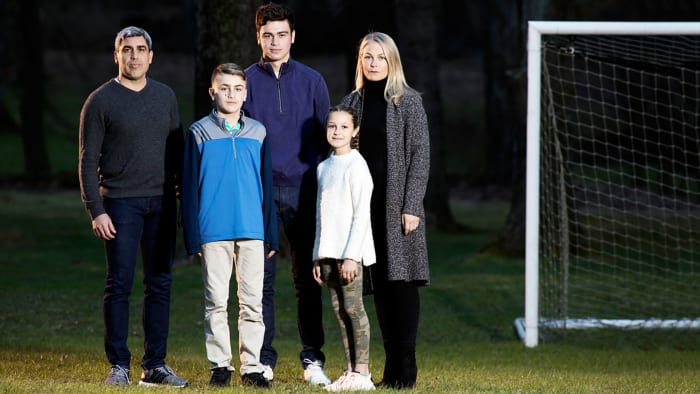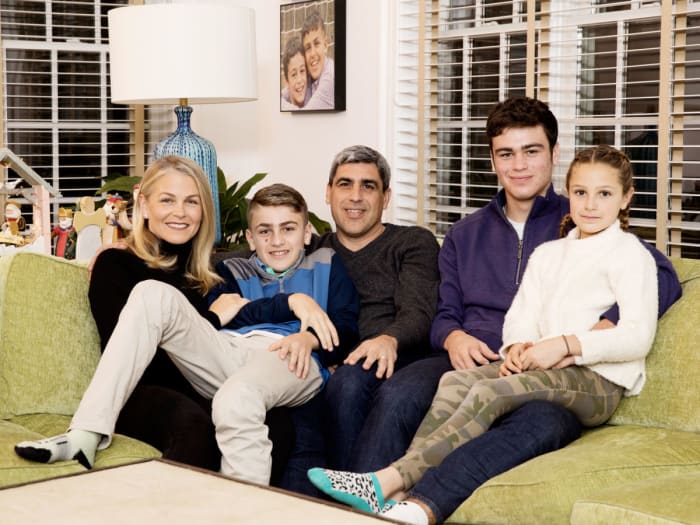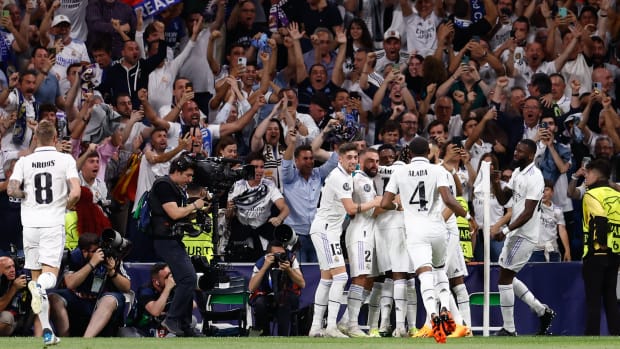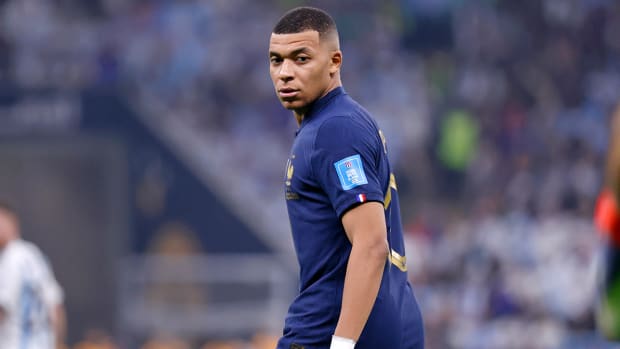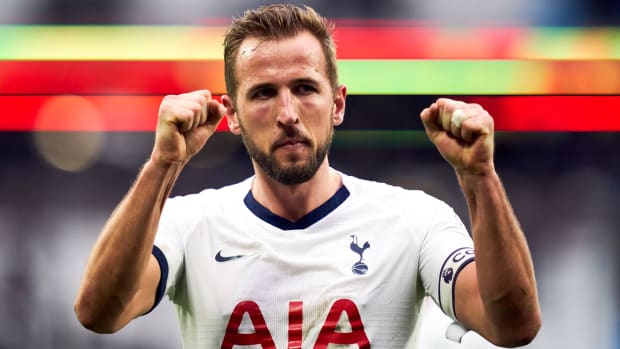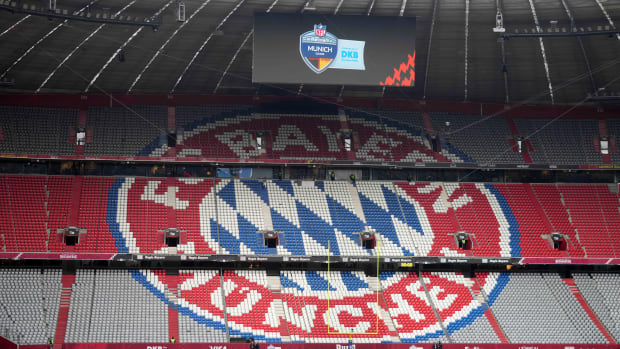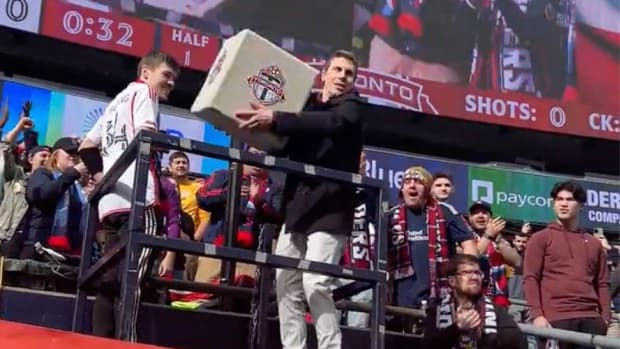The Reyna Family's Story of Loss and Legacy
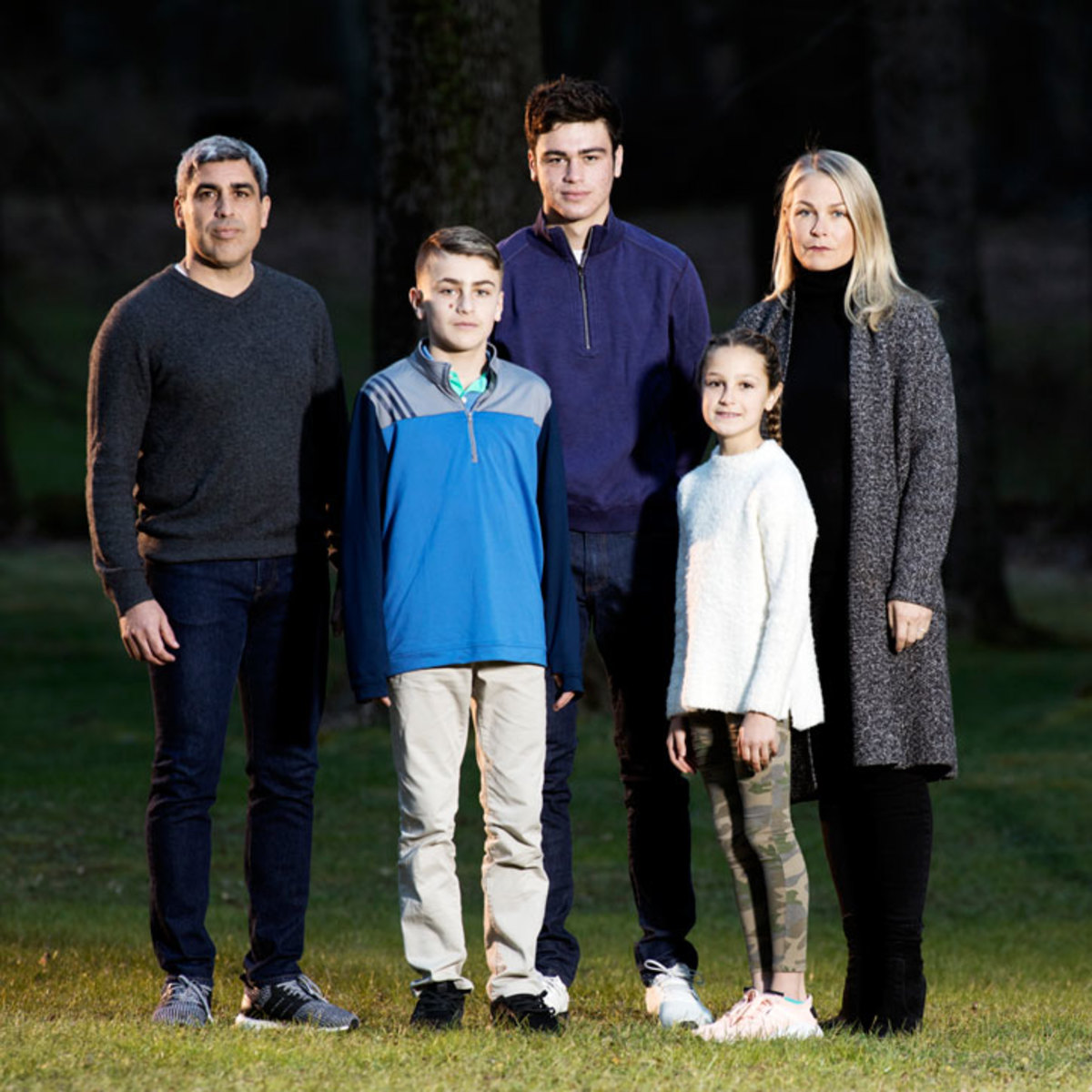
They were American soccer’s royal couple. In the summer of 1994, not long before the U.S. hosted the World Cup, the U.S. men’s and women’s national teams were both staying in Laguna Beach, Calif., at the Holiday Inn. Claudio Reyna, a three-time NCAA champion at Virginia, was an emerging star, a gifted playmaker who had just made the first of his four World Cup squads. Danielle Egan, on her way to winning four NCAA titles at North Carolina with players like Mia Hamm and Kristine Lilly, was a speed demon on the wing who had recently scored her first goal for the world champion U.S. women. Their futures had no ceiling: Reyna and Egan were both 20 years old.
Reyna was handsome, with thick, dark hair in a bowl cut, the New Jersey-born son of immigrants from Portugal and Argentina. Egan was gorgeous, a blonde tomboy, the pride of an Irish-American family on Long Island. They met in the hotel lobby. Reyna was speaking to some women’s players. Egan was looking for her roommate. He still remembers his pickup line: “Do you like pizza?” She did. They talked that night. They kept talking all summer. In three years they were married.
From 1995 to ’99, a time when European soccer seemed exotic and was almost never broadcast on U.S. television, the Reynas lived their own two-person continental adventure. Claudio played in the German Bundesliga for Bayer Leverkusen, and then Wolfsburg. Danielle competed for a period in the German women’s third division, but it wasn’t nearly as serious as her Carolina days. Teammates smoked cigarettes and drank beer at halftime, and the eight-hour bus rides to games were brutal. So she stopped, and whenever Claudio had an off day husband and wife would pick a random spot on a paper map and drive there. Amsterdam, Brugge, Rotterdam. “Even little towns,” says Danielle. “We’ve been to more places in Holland than most Dutch people.”
So much was happening. They lived in a modest one-bedroom apartment, drove a Volkswagen Beetle and hosted college friends for visits. Claudio’s career was taking off. Life was simple and pure and thrilling.
And it got even better when their son Jack was born in April 1999. Claudio had just transferred to Rangers, a storied club in Glasgow, and the couple’s first months in Scotland were marked by a domestic league title and the joy of being around their newborn.
“He was the easiest baby, the perfect firstborn child,” says Danielle. “He was like the first baby of everyone, soccer-wise. I’ve been told so many times: ‘The reason we had our baby was because of Jack.’”
In the years ahead, whenever Claudio joined up with the national team, Jack was the unofficial team mascot, running up and down the sideline at practice.
“I never saw anyone laugh and smile as much as him,” says Claudio. “He was so enthusiastic about everything.”
Ultimately, as Claudio moved from Rangers to Sunderland to Manchester City to the New York Red Bulls, the Reynas would have four children in all, each with their own personalities and interests. Jack, who once recited poetry in UK speaking competitions with a full posh British accent, loved geography and architecture, and he fell for soccer by memorizing the names of famous stadiums.
Giovanni (aka Gio), born in 2002, had a Manc accent that he lost, just as Jack did with his once they came to live in the States in 2007. Always more quiet than Jack, Gio is now one of the U.S.’s top soccer prospects, a 16-year-old forward who blends Claudio’s soccer IQ and Danielle’s athleticism, has his own Adidas video ad and just moved to Germany, where he’s expected to join Borussia Dortmund soon. (Former NYCFC coach Patrick Vieira has compared Gio to his French World Cup-winning teammate David Trezeguet.)
Joah-Mikel, now 11, likes cooking and soccer, especially the tactical side of the game. And Carolina, the Reynas’ daughter, whip-smart at age 9, plays several sports and makes sure Joah doesn’t forget anything on his way to school.
After his playing days, Claudio became the youth technical director for U.S. Soccer and then, in 2013, the sporting director at New York City FC. Don’t get him wrong, he was deeply disappointed when his team lost to Atlanta United in the recent MLS playoffs. But the Reynas also have a perspective on what matters in life that they earned in the most excruciating way possible. In May 2010, shortly after Jack’s team won the New York State Cup for his age group, he complained to his parents of a splitting headache.
“At first,” says Danielle, doctors “thought maybe it was meningitis or Lyme disease or a sinus infection. But he had no other symptoms. None.”
Then a neurologist noticed an issue with Jack’s peripheral vision in his left eye, and a subsequent CAT scan revealed a golf-ball-sized brain tumor. Surgery came next, followed by an agonizing three-week wait for a diagnosis.
The result: Jack had stage IV glioblastoma, the kind of tumor John McCain and Ted Kennedy had—an extremely rare and aggressive condition, one that affects mostly men in their 60s and 70s.
Jack Reyna was 11.
Jack (lying on his parents’ bed): Mom, am I going to die?
Danielle: Well, we all die. We just don’t know when. We don’t know if we’re going to be young. We don’t know if we’re going to be old. We don’t know if we’ll be hit by a truck, or get cancer. No one knows. It just kind of comes. When God is ready for you, he will come.
Upstairs, in the boys’ bedroom, the Lego structures are still intact. Intricate and towering, with as many as a thousand pieces each, the creations are a window into the mind of the boy who built them. A four-foot-high Eiffel Tower with the French tricolore on top. A block of three-story townhouses on a British streetscape. An elaborate recreation of the Death Star from Star Wars, replete with Luke Skywalker, Han Solo and stormtroopers. Whenever Jack was suffering from his chemotherapy—from the nausea and the pain—he would repair to his room and work with the plastic bricks.
“This was like his relaxation after chemo,” says Danielle. “He was very proud of this.”
Adds Claudio: Each one “took a couple of weeks. He would go in here and sit. It was like his distraction. His therapy.”
It’s a cloudy fall morning. The Reynas’ house in Bedford, N.Y., an hour outside Manhattan, is a monument to their children, to sports, to art and to the warmth of a family that welcomes a steady stream of friends and relatives through an open door. A basketball hoop stands sentry out front, and the backyard opens onto a soccer field, the fencing around its goal having been repaired not long ago after years of pounding by the kids.
On the boys’ bedroom walls: a Lionel Messi jersey signed by the Argentine national team; an autographed Thierry Henry Barcelona shirt; jerseys dedicated to Jack by the Dutch national team and by Inter Milan legend Javier Zanetti. There’s also a wall-sized mural of a world map, designed for Jack, with the names of all the countries. Down in the living room, Claudio and Danielle sip coffee and share Jack’s story for three hours, their memories punctuated in nearly equal parts by smiles, laughter and tears.
Back in their playing days, Claudio and Danielle shared a similar reputation for setting up teammates with perfectly-weighted passes—just the right speed, touch, direction and placement to give the receiver the best possible opportunity to do something positive with the ball. They do the same with each other when describing their firstborn son.
Danielle: “He was really smart. Super into geography—”
Claudio: “—geography, architecture, capitals. The second I got into the car, wherever we drove, he didn’t stop asking me questions. I couldn’t believe how happy he was with everything, including when we took him out to dinner. Do you remember?”
Danielle: “Especially in Europe. They didn’t always love when kids came. But we knew we could bring him to any restaurant, no matter how fancy. We would show up with this toddler, and they would gasp and say, ‘He’s so well-behaved!’”
Claudio: “He always liked trying new kinds of food. The joy he had for life was just incredible. He would amaze us all the time—”
Danielle: “—and he loved chatting with adults. He was kind of like an old soul, talking about his travels and asking people about where they had been. He was super-inquisitive about other people’s lives.”
Claudio: “We didn’t even talk about his dancing.”
Danielle: “He loved music.”
Claudio: “If music was on, he was dancing. Pop. Hip-hop. Everything.”
A long pause. Slow, deep breaths. Tears.
Claudio: “He taught us how to love more, to trust more. You could count on him. You knew the love he had for his family.”
Danielle: “And he loved how good Gio was at soccer. He [always] let Gio play with him and his friends. He always included him.”
From the start, Gio was a freakish natural athlete, a child who could watch golf on TV for a few minutes and then pick up a club for the first time and hit picture-perfect iron shots in the backyard. He could dunk a basketball in the eighth grade. By the time he was 5, he was dominating Under-9 soccer games in the park. Claudio remembers how parents would give him the wink-wink, nudge-nudge look, assuming he was running Gio through countless hours of soccer drills, Marv Marinovich-style, on their backyard field. “What do you do with him?” they asked.
“Nothing,” replied Claudio, who’d once helped coach Jack’s youth team but by now did little more than mess around with his boys in the backyard. They had no idea, Claudio thought to himself. Gio’s “training?” He was just playing with Jack and his older friends.
“That’s what carried Gio, what launched him,” says Claudio. “He played with Jack. He fought with him. Jack would go in goal and let him shoot—not always let him win, though, that’s for sure. And Gio fought and fought, and that’s why he played. That’s who he wanted to be. He idolized and worshipped Jack. The one who made him what he is today, his talent, was really Jack.”
Jack is a boy. He has curly dark hair and soft brown eyes.
Jack’s smile is everybody's favorite.
Jack has lots of favorites.
Jack loves food. He likes strawberries and salad and especially Lela’s Milanese.
But sushi is his favorite. His favorite restaurant is Nobu in New York City. He went there for his 13th birthday.
Jack plays lots of sports. He loves basketball and football, especially the Baltimore Ravens.
But his favorite sport is soccer. His favorite soccer team is Man City.
Jack has played on many soccer teams. His favorite coach is his dad, and his favorite player is his mom.
- From Jack’s Favorites, a children’s book written by Liz Johnson, Jack’s fifth-grade teacher at Greenwich Country Day School
Jack fought. Oh, he battled. Chemo started right after the World Cup in 2010: Once every five weeks, for nine months, Jack and his parents would visit New York University’s Hassenfeld Children’s Center for Cancer & Blood Disorders. It always made Jack sick afterward. So did the radiation treatment he received for another six weeks.
“The bravest person I ever met,” says Kristian Shkreli, who played youth soccer with Jack and later with Gio on NYCFC’s U-19 team. “Always, no matter what, he had a smile on his face.”
After Jack’s diagnosis, Claudio had taken a leave of absence from his job with U.S. Soccer.
“A complete fog,” he says of those days. “I couldn’t even take in information. I would sit with Jack all week. [Danielle and I] would live at the hospital and see the doctors and tag-team sleep.”
Then, in April 2011, came what seemed like a reprieve. After nine months of chemo, everyone celebrated Jack’s 12th birthday with fantastic news: His MRIs were clear. No cancer.
“The doctors were amazed,” says Danielle. “They said, ‘We’ve never seen a kid bounce back from radiation or chemo like this. He is such a fighter, he is always so positive.’”
Tim Gerber, another old friend, remembers meeting Jack for the first time that September, at the start of seventh grade. He heard Jack talking to a teacher about soccer, and he could tell this kid knew his stuff.
“I was a big soccer fan, and you don’t find many in our town,” says Gerber. “So I butted into the conversation, and we made a fast connection.” They would spend hours and hours playing FIFA.
In December, though, Danielle noticed Jack’s speech was a little off, and so she and Claudio took him back to NYU. The bad news: Doctors said his cancer was back. The worse news: They would treat Jack, but it would only slow down his steady deterioration.
“That’s when we knew,” says Claudio. “There was nothing you could do.”
Over Jack’s final seven months, whenever he had the energy, he and his family would attack his bucket list. The Reynas traveled to Mexico (where at the hotel swimming pool Gio switched roles, helping Jack when he needed it). They toured the top of the Empire State Building, dined at Nobu, watched the Ravens from field level and met Dirk Nowitzki at a Mavericks-Knicks game. But there were other days when Jack didn’t want to go out at all. Or his parents didn’t.
“Days I couldn’t even leave our bed,” says Claudio. “We couldn’t even move. Didn’t want to go anywhere.”
For the most part, though, the Reynas kept their front door open, and visitors poured through. Gerber came by on Champions League matchdays or to play FIFA and talk sports and girls.
Liz Johnson, Jack's fifth-grade teacher, always stopped over on Wednesdays to see Jack. When 3-year-old Carolina saw her, she said, “You’re Jack’s favorite teacher!” On her drive home one day, Johnson decided to write a children’s book for Carolina about her brother called Jack’s Favorites. When she read the story to Jack, he flashed one of his brilliant smiles.
Jack likes school and he's good at it. He solves math problems faster than his friends, and he reads lots of books.
His favorite subject is geography. Jack knows all the countries and all the capitals in the world almost.
One of Jack's favorite things to do is travel. He likes to fly on airplanes and visit new places. Jack has been to many cities, including Paris, Rome, London, Milan, Amsterdam and Buenos Aires, just to name a few.
Jack loves dancing and music too. His favorite concert was Jay-Z in Carnegie Hall in New York City. He went there with his dad in 2012. He even got to go backstage and meet Jay-Z in person.
P.S. Jack has moves.
At home, Jack was put on a morphine drip to ease the pain. But even as he lost his abilities to walk and eventually to speak, the visitors kept coming. Claudio and Danielle still marvel at the 12- and 13-year-old classmates who would sometimes spoon-feed their dying friend.
“I don’t know how we did it,” says Claudio, “but despite all the sadness we had this really happy place. People wanted to be here. It was loud, and he loved it. [We] felt it was important for him to see that everyone was still happy.”
The Reynas had resolved that they still had to have joy in their family, Danielle explains, but their emotions were complex.
“Nobody should have to watch their child, someone they love, die,” she says. “It’s horrible. You could tell he was fighting it. We had him in the house, and there were almost always at least 20 people around, sometimes more. He got good energy from them. People also needed to see him. And from what friends have said, they needed to see us. And they got strength from us. The day he died, we called the hospice near us. We kind of knew it was coming. She came and said it was. And we sent Gio to two of our best friends here. Then Jack passed. You’re so numb at that point. You don’t want him to go, but you don’t want him to be in pain anymore.”
Jack Reyna passed away on July 19, 2012, at the age of 13, surrounded by people who loved him.
One day after Jack’s funeral, Claudio and Danielle were sitting in their backyard with some friends and family. A recent rain had cleared, and everyone gazed up at the sky to witness an upside-down rainbow shaped like a human smile. Jack.
“I had never seen one in my life,” says Claudio. “None of us had. It was perfect.”
Six years after Jack’s death, his presence remains palpable in so many ways. A half-dozen friends wrote about him in their college application essays. A few years ago, Gerber penned a 25-page diary entry about Jack (“My Hero”) that he plans to give to Claudio and Danielle. Now a sophomore at Dartmouth, Gerber is studying economic development, dreaming of someday working for a nonprofit or starting a social entrepreneurship company.
“A lot of what I think about my future is because of what Jack taught me about the importance of being kind to others and about the privilege that we have,” Gerber says. “Not just getting to go to great schools and have the chance to travel and have different experiences, but also the ability to wake up every morning and see the people you love and be a good brother, a good teammate, a good family member.”
Claudio and Danielle remember seeing a family therapist when Jack was sick, and their counselor was struck by how they managed to still spend time with their other kids, preventing their home from descending into total gloom, maintaining support for one another. They’d heard stories about couples divorcing after losing a child, and they wanted to make sure it didn’t happen to them.
Asked if they have any advice for parents in a similar situation, Claudio and Danielle point out that every case is different. But then Danielle says: “Keep laughter in your family. Respect each other’s strengths and weaknesses and grieving processes, because we’re all different humans, and you’re not always going to be on the same wavelength or in the same mood. Be as happy as you can with the kids. Don’t sweat the small stuff. That’s a cheesy little saying, but it’s really true.”
For Claudio, this shared experience brought even more perspective to the idea of what’s important and what isn’t.
“You’re living for your children. But this took it to a whole other level,” he says. “You have to be really strong every day, but also understand that I would feel very good one day and she wouldn’t—or vice versa. There are these different waves.”
The notion that it gets better with time, though? That’s not true, Claudio says. Every Christmas, every Thanksgiving, every birthday without Jack is still painful. Not long ago, when the family was driving through New York City, their car’s GPS system had them pass by the NYU hospital where they’d spent so much time with Jack.
“We didn’t even say a word, but I knew Danielle was thinking about it,” Claudio says. “There are constant reminders.”
And those reminders lead frequently to hypotheticals. “Where would he be now?” Danielle asks of Jack, who would be 19, a college sophomore. “Would he be playing college soccer? Would he be at UVA? At Carolina? Because to me he was that kind of player. Would he have a girlfriend? What would he be studying?”
One question they feel comfortable answering: What would Jack think about Gio’s emerging soccer stardom?
Claudio tells a story. In Jack’s final months, just before he started using a wheelchair, he went with his dad to see Gio’s tryout for a basketball team. Jack was slurring his words by then, but 30 minutes into the session he turned to Claudio, with his trademark smile, and said, “Dad, Gio is the best player here by far.” And he was right.
“He wasn’t jealous about anything,” says Claudio. “He absolutely thought Gio was incredible.”
The feeling was mutual. Gio was 9 when Jack passed away. And while Danielle says Gio was mostly quiet about it, she could tell it was extremely difficult for him. The evening after Jack died, she says, her voice breaking, Gio told her: “I’m never going to be a good soccer player now, because my big brother taught me everything.”
Years later, Jack’s presence is felt every time the Reynas watch Gio play. His rise to the top of the U.S. soccer prospect pool was swift and at times overwhelming for the family. In April 2017, when Gio was 14, his NYCFC team won the Generation Adidas Cup, a tournament for MLS U-17 teams, and Gio was named the event’s best player.
The following month, at the Torneo Delle Nazioni in Italy, he had four assists and four goals, including the game-winner in the final against England, as the U.S. U-15 national team won one of the world’s most prestigious youth tournaments.
Europe’s top clubs scouted the event, and afterward Claudio started receiving calls from teams in Germany, the Netherlands, England and Italy.
At 14, Gio hired an agent, and he signed a long-term endorsement deal with Adidas after a bidding war with Nike. He also secured a Portuguese passport (through Claudio’s mother), which allowed him to sign officially with a European club when he recently turned 16—as opposed to having to wait until he turned 18 per FIFA rules if he only had a U.S. passport. In August, Goal.com reported that Gio was set to join the academy of Borussia Dortmund, the club of fellow American Christian Pulisic. (Claudio said he had no comment for now on Gio’s club future.) For the past couple months, Gio has been in Germany acclimatizing to the environment as he waited to turn 16.
The decision for Gio to leave for Europe was hardly an easy one. When Pulisic joined Dortmund at 16, he was able to live with his father, Mark, for the first two years. Claudio and Danielle can visit Gio, but they have to stay in the New York area for their two younger kids and for Claudio’s job. Meanwhile, Claudio has received criticism from some quarters of MLS and from NYCFC supporters for not keeping Gio with the team he works for, or even signing him to an MLS pro contract and then selling him for a transfer fee to, say, Dortmund.
“I believe 100% in what we’re doing at NYCFC,” says Claudio, “but I have to remove my hat as a sporting director for him. I’m his dad first, second and third, and I’m going to support him” and what Gio decides to do.
Danielle, meanwhile, says that, as a mother, part of her desperately wanted Gio to stay at home with NYCFC—at least until he turned 18.
“The thought of him leaving at 16 is pretty heart-crushing,” she says. “I’m sure it has something to do with Jack, too, in the sense that I have relied on [Gio] as the big boy. ... I cry a little just thinking about it.”
But it’s hard for anyone to argue against the notion that, in soccer terms, Dortmund would be the best possible place for Gio’s career. The club has a proven track record of developing young talent and for giving those players opportunities with the first team, even in Champions League games. And Gio’s potential is tantalizing.
“He’s much more of an athlete than I was, much more of a goal scorer,” says Claudio. “He’s very technical and has a good feel for the game. He has a great free kick and can strike a ball well. Danielle was a great runner—and he’s a runner.”
It’s no wonder that Gio’s first ad campaign with Adidas focused on creativity, presenting him as part of the solution in reviving U.S. soccer after the World Cup 2018 qualifying failure. And while Gio has his own distinct identity, the influence of Claudio, Danielle and Jack is unmistakable.
Never was that more clear for Claudio and Danielle than on April 8, 2016, one day before Jack would have turned 17. Gio, then 13, was playing against Uruguay in his first international appearance for the U.S. U-15 team. The game was in Rosario, Argentina, the birth country of Claudio’s father, Miguel, who had traveled with his wife, Maria, to watch alongside Claudio and Danielle.
Gio was magical that day in a 2-0 U.S. victory, and in the 38th minute he scored a truly remarkable goal. Running at speed onto a pass down the right side, Gio was tripped by a lunging Uruguayan defender and fell to the ground in a somersault, then somehow vaulted back up to his feet without missing a step. The assistant referee raised his flag for a foul, but the referee played the advantage, and Gio beat two more defenders before coolly slotting his shot past the goalkeeper into the net.
Claudio can’t tell the story of that day without breaking down in tears.
“It’s hard for us,” he says between sobs. “We do bring up Jack to Gio. We talk about Jack all the time, but we don’t want to push it on him. Sometimes we say, ‘Your brother is with you.’ And that day [in Rosario] there was no doubt. The next day was Jack’s birthday. The whole game Gio was ridiculous. You don’t know how your kid is going to do, and he had such an amazing game.”
That day, the Reynas couldn’t help but imagine Jack turning to Claudio again, flashing his proud smile and saying: “Dad, Gio is the best player here by far.”
